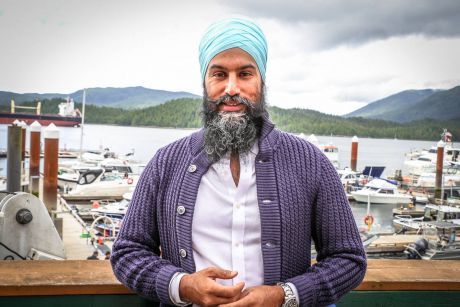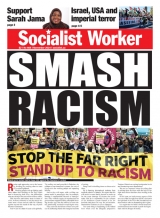Columns
You are here
A vote for Singh and the NDP is a blow against bigotry

October 14, 2019
The 2019 federal election has been defined by two issues: climate change and racism.
Climate activists know the two issues are intertwined. The crucial role of Indigenous people in the fight against climate change makes them a threat to “business as usual”. And global warming brings rising oceans, droughts and famines that create refugees.
So when Maxime Bernier denies the existence of climate change, along with his anti-immigrant rhetoric, we see two sides of the same coin.
Racism is at the core of this election because racism is at the core of this country. The casual, institutionalized racism that is bred into the structures and attitudes of the colonial state were revealed early when Jagmeet Singh won the NDP leadership. Who didn’t hear this comment: “I’m not racist, but I don’t think this country is ready for a prime minister in a turban.”
Things might have stayed there if not for the revelation of Justin Trudeau’s blackface and brownface photos. Whatever claim to moral high ground Liberals may have held was gone. Partisan spin control attempted to diminish the issue to a youthful indiscretion.
Bushes were beaten and Liberal supporters who are people of colour were interviewed by the mainstream media, saying they accepted Trudeau’s apology, and pointing to his record on supporting diversity. And when critics replied that Trudeau’s actual record failed to live up to his rhetoric, the answer was “at least we’re better than the Tories.”
Right on cue Liberals got down in the gutter and attacked Tory candidates with a history of homophobic, Islamophobic or racist statements. They didn’t have to look far to find them.
The election was beginning to look like a 3 Stooges movie food fight. It would have been easy for Jagmeet Singh to join in.
Instead, Singh talked calmly about facing racism every day. He spoke directly to the small hurts and thoughtless insults that newcomers and people of colour face routinely. Then came the video of Singh being accosted by a man who suggested he “cut off your turban” in order to “look more like a Canadian”. Who could not sympathize with those who have to deal with such stupidity on a daily basis.
It turned out the man thought he was being supportive. He belongs firmly in the “I’m not a racist, but …” camp of casual, institutional bigotry.
Crucially, Singh also has held a mirror in front of the media, remarking on the absence of POC, and the casual racism that results from that lack of diversity. Indeed, nothing captured the essence of this election cycle more profoundly than the spectacle of four white talking heads debating whether or not Trudeau was truly racist.
His message was solidarity and support for the victims of racism, not scoring cheap points attacking Scheer and Trudeau. Nor did he succumb to pressure to “forgive” Trudeau’s racist episodes. So when he did criticize–and there was plenty to criticize them for–his words had more impact.
Reconciliation
Just in case we had missed the point, Trudeau chose to remind Canadians that his commitment to reconciliation with Indigenous people was only skin deep. He announced that he was appealing a Human Rights Tribunal finding that his government (and previous governments) had “willfully and recklessly” discriminated against Indigenous children by underfunding services for them.
In contrast, Singh traveled to the Grassy Narrows First Nation, where generations of people have been victims of mercury poisoned water. He pledged to make safe drinking water for all Indigenous communities a priority. And specifically he promised to clean up Grassy Narrows and fund health services for victims of mercury poisoning.
When a Global TV news reporter glibly accused him of giving a “blank cheque” to Indigenous people, Singh turned the tables without missing a beat. “Would you be asking this question if Vancouver did not have clean drinking water? … Why then should we ask a question about whether or not Indigenous people should have clean drinking water?” So when he proceeded to remind us that if there was money to bail out pipelines and for corporate welfare, there should be money for Grassy Narrows, his words carried even more weight.
At every step of the campaign, Jagmeet Singh has resisted the opportunity to score cheap points. Instead he has used the campaign to shine a light on the everyday racism–sometimes hidden, sometimes overt–that Indigenous people and POC face.
Encouragingly, as he has done so Singh has risen in the polls to where the NDP poses a real threat to the Liberals. So the knives are out, and Liberal supporters are working overtime to find a vulnerability in Singh’s campaign.
Quebec and Bill 21
Just like the Liberals try to deflect accusations of racism by pointing to the Tories and saying “They’re worse”, so does English Canada point to Quebec. Bill 21, the so-called secularism law provides the ammunition.
When Singh refused to commit to using the weight of the Canadian state to intervene in Quebec, critics in the media and the Liberal camp pounced. This revealed that Singh was a hypocrite, they claimed, more intent on winning seats in Quebec than standing up against racism.
The charge is absurd and, given the conduct of the campaign, insulting.
Singh was clear he opposed Bill 21. “There's been no prevaricating, I think about growing up and being told that I couldn't be what I wanted because [of] the way I looked, and I know many people were told that they could not advance in their careers because of who they are. And now we've got a law that basically tells people exactly that.”
But he was equally clear that coming from outside, and telling the people of Quebec what to do was the worst idea. Like it or not, the fight against racism is complicated by Quebec nationalism. Bill 21 is popular in Quebec, and will only be defeated by building a strong anti-racist movement from within the nation of Quebec.
The left party, Quebec solidaire has taken that route, after strenuous debate. So has Singh, arguing that his very campaigning in Quebec is a form of opposition to Bill 21.
There is no doubt that in many ways the NDP falls short: on climate change; on reversing austerity and cuts to services; and more. But they still are favourable to the others, if they come through on promises like pharmacare, daycare and Indigenous reconciliation, it's a huge push against the divide and conquer tactics of the right.
Simply voting NDP will not end the systemic racism that this election campaign has exposed.
But a vote for Singh and the NDP is a blow against the bigots, and will prevent that racist reality from being swept back under the rug.
Section:










